
ENVIRONMENTAL VALUES
Scope & Guideline
Advancing the Dialogue on Environmental Philosophy
Introduction
Aims and Scopes
- Interdisciplinary Environmental Ethics:
The journal focuses on the ethical implications of environmental issues, integrating perspectives from philosophy, sociology, economics, and cultural studies to explore how values shape our interactions with the environment. - Cultural and Historical Contexts:
It emphasizes the importance of cultural and historical contexts in understanding environmental values, examining how different societies perceive and value nature across time and space. - Political Ecology and Social Justice:
The journal addresses the intersections of environmental issues with social justice, exploring themes such as colonialism, gender, and race in environmental discourse. - More-than-Human Perspectives:
A core area of focus includes more-than-human ethics, which considers the rights and values of non-human entities and ecosystems in environmental discussions. - Pragmatic Approaches to Environmental Issues:
The journal encourages pragmatic approaches that blend theoretical insights with practical solutions to contemporary environmental challenges, fostering discussions around sustainability and ecological governance.
Trending and Emerging
- Decolonization and Indigenous Perspectives:
There is an increasing emphasis on decolonizing environmentalism, showcasing Indigenous knowledge systems and perspectives that challenge colonial narratives in environmental governance. - Emotional and Affective Dimensions of Environmentalism:
Recent works highlight the role of emotions and affective politics in environmental movements, exploring how love, care, and emotional engagement influence environmental ethics and activism. - Degrowth and Economic Alternatives:
The concept of degrowth is gaining traction, with discussions focusing on alternative economic models that prioritize ecological sustainability and social equity over traditional growth metrics. - Technological Ethics and Environmental Futures:
Emerging themes include the ethical implications of technology in environmental contexts, critically examining the role of artificial intelligence, biotechnology, and digital media in shaping environmental values. - Intersectionality in Environmental Justice:
The journal is increasingly addressing intersectional issues within environmental justice, exploring how various social identities and power dynamics influence environmental policies and practices.
Declining or Waning
- Traditional Economic Valuation Methods:
There is a noticeable decrease in the focus on conventional economic valuation methods, such as cost-benefit analyses, as the journal increasingly prioritizes relational and ethical frameworks that challenge conventional economic paradigms. - Anthropocentric Environmental Philosophy:
Themes rooted in anthropocentric perspectives are becoming less prominent, as the journal shifts towards more ecocentric and biocentric approaches that prioritize the intrinsic value of nature beyond human interests. - Generalized Environmental Policy Analysis:
Discussions centered around generic environmental policy analysis appear to be waning, giving way to more nuanced explorations of specific case studies that highlight local and contextual values.
Similar Journals
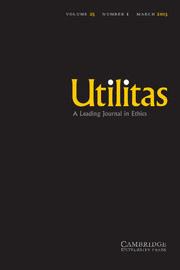
Utilitas
Bridging philosophy and social sciences for impactful discourse.Utilitas, published by CAMBRIDGE UNIVERSITY PRESS, is a prominent journal in the fields of Philosophy and Social Sciences, specifically Sociology and Political Science. Established in 1989, this esteemed journal has developed a reputation for its rigorous peer-reviewed articles that explore significant philosophical theories and their implications in societal contexts. With an impressive impact factor and consistently ranking in the Q1 category for Philosophy and Q2 for Sociology and Political Science, Utilitas serves as a vital platform for scholars to disseminate innovative research and engage with contemporary debates. The journal provides a comprehensive range of studies, emphasizing critical approaches to utilitarianism and ethical considerations in modern society. Researchers, professionals, and students alike will find Utilitas an invaluable resource, fostering an environment of intellectual growth and discourse in the ever-evolving landscape of philosophy and social science.
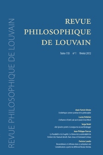
REVUE PHILOSOPHIQUE DE LOUVAIN
Exploring the Depths of Philosophical ThoughtREVUE PHILOSOPHIQUE DE LOUVAIN is a distinguished academic journal dedicated to the exploration of philosophical discourse and thought, published by PEETERS in Belgium. With an ISSN of 0035-3841 and E-ISSN 1783-1768, this journal has been a significant contributor to the field of philosophy since its inception in 1973. Although it has been classified in Q4 in the 2023 Philosophy category with a Scopus rank of 488 out of 762, the journal has established a reputation for fostering rigorous dialogue and covering a diverse array of philosophical topics through comprehensive articles and critical essays. Despite a temporary discontinuation in Scopus coverage from 2019 to 2021, REVUE PHILOSOPHIQUE DE LOUVAIN remains a significant platform for scholars, professionals, and students looking to engage deeply with contemporary philosophical issues. The journal's commitment to philosophical inquiry is complemented by its accessible publication model, although it does not currently offer open access options. For those based in or visiting Leuven, Belgium, the journal's office is located at BONDGENOTENLAAN 153, B-3000 LEUVEN, BELGIUM, a hub of intellectual engagement in the heart of Europe.

Horizon-Fenomenologicheskie Issledovaniya
Fostering Interdisciplinary Dialogue and DiscoveryHorizon-Fenomenologicheskie Issledovaniya, published by ST PETERSBURG UNIV PRESS, is an esteemed open-access journal that has been contributing to interdisciplinary discourse since its inception in 2012. With ISSN 2226-5260 and E-ISSN 2311-6986, the journal serves a diverse array of fields, prominently featuring areas such as Artificial Intelligence, Control and Optimization, and Philosophy, as indicated by its recent quartile rankings across multiple categories in 2023. The journal's commitment to accessibility, having adopted an open-access model since 2014, ensures that its scholarly articles are freely available, fostering knowledge dissemination and collaborative research among students, professionals, and academics alike. Based in the Russian Federation, the journal not only enhances local academic inquiry but also engages with a global audience, thus contributing to the broader philosophical and scientific landscapes. Through its rigorous editorial standards, Horizon-Fenomenologicheskie Issledovaniya remains a vital platform for cutting-edge research and thought leadership in the realms of both philosophy and applied sciences.
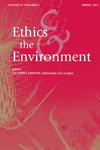
Ethics and the Environment
Fostering Interdisciplinary Dialogue on Ethics and Nature.Ethics and the Environment is a distinguished journal dedicated to the dialogue between ecological considerations and moral philosophy, published by Indiana University Press. With an emphasis on fostering interdisciplinary discourse, this journal addresses the ethical implications of environmental issues, making it an essential resource for researchers, professionals, and students in both the fields of Environmental Science and Philosophy. As of 2023, it holds a notable impact factor with its Q4 ranking in Environmental Science (miscellaneous) and a favorable Q2 ranking in Philosophy, reflecting its relevance and contribution to ongoing scholarly discussions. Although not an open-access publication, it provides valuable insights that hold practical significance for policy-making, conservation efforts, and sustainability practices. With coverage spanning from 2013 to 2024, the journal continues to engage with current global environmental challenges through a philosophical lens, positioning itself as a crucial platform for ethical explorations in environmental discourse.
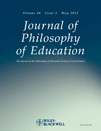
JOURNAL OF PHILOSOPHY OF EDUCATION
Innovating Pedagogical Practices with Philosophical Insights.JOURNAL OF PHILOSOPHY OF EDUCATION, published by Oxford University Press, serves as a premier platform for interdisciplinary research at the intersection of education, history, and philosophy. Established in 1967, this journal has consistently contributed to the academic discourse by publishing insightful articles that challenge conventional thinking and inspire innovative pedagogical practices. With a distinguished ranking in the top quartiles of History and Philosophy and a respectable Q3 position in Education, it occupies a significant niche in the scholarly community. The journal's high Scopus rankings signify its impact, being placed in the 94th percentile for History and the 86th percentile for Philosophy. It welcomes contributions that explore theoretical frameworks, historical contexts, and practical implications of philosophical inquiries into education. Although it does not currently offer Open Access options, the journal remains a vital resource for academics and practitioners seeking to deepen their understanding of educational philosophy. With contributions expected to continue until 2024, the JOURNAL OF PHILOSOPHY OF EDUCATION is poised to remain a crucial avenue for advancing educational thought and research.

Pensando-Revista de Filosofia
Illuminating Contemporary PhilosophiesPensando-Revista de Filosofia, an esteemed publication by UNIV FEDERAL PIAUI, EDITORA, serves as a vibrant platform for philosophical discourse and exploration, anchoring its significance within the field of philosophy. With the ISSN 2178-843X, this journal aims to promote critical thinking and disseminate innovative ideas that advance the study of philosophical theories, contemporary issues, and interdisciplinary approaches. Although it currently operates under non-open access terms, researchers and scholars can look forward to insightful articles that contribute to enriching the philosophical landscape. The journal is nestled in Bom Jesus, Piauí, Brazil, and welcomes submissions that engage with both traditional philosophical frameworks and contemporary dilemmas, encouraging a diverse array of perspectives. With a commitment to academic rigor and an aim to inspire both professionals and students alike, Pensando stands as a crucial resource for anyone eager to deepen their understanding of philosophy and its relevance in today's world.

Teoria-Rivista di Filosofia
Fostering Critical Dialogues in PhilosophyTeoria-Rivista di Filosofia is a distinguished academic journal published by EDIZIONI ETS, based in Pisa, Italy. With a focus on philosophical discourse, this journal is a valuable resource for researchers, professionals, and students in the field of philosophy. Having achieved a commendable Q3 ranking in the 2023 category quartiles, Teoria stands out in the competitive landscape of philosophy journals, with a Scopus rank of #612 out of 806, placing it in the 24th percentile. Although currently classified as a non-open access publication, it frequently addresses cutting-edge themes and challenges within philosophical research, promoting rigorous analysis and diverse perspectives. The journal spans various topics across multiple issues from its inception in 2011 to its ongoing publications scheduled through 2024, making it a relevant venue for contemporary philosophical inquiry. The journal aims to foster scholarly communication and stimulate critical debates, contributing significantly to the global philosophical landscape.
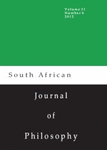
SOUTH AFRICAN JOURNAL OF PHILOSOPHY
Exploring the Depths of Philosophical ThoughtSouth African Journal of Philosophy is a leading scholarly platform specializing in various dimensions of philosophical discourse, published by Routledge Journals, Taylor & Francis Ltd. With an ISSN of 0258-0136 and an E-ISSN of 2073-4867, this esteemed journal presents rigorous research reflecting a wide range of philosophical themes and traditions. It has achieved recognition in the 2023 Scopus rankings, positioned in the Q2 quartile within the field of Philosophy, and ranking #221 out of 806 journals, placing it in the 72nd percentile. As a critical resource for researchers, academics, and students, it contributes to an enriched understanding of philosophical inquiries, promoting a diverse and inclusive dialogue. While the journal operates on a traditional access model, it maintains a commitment to excellence in academic publishing, fostering global engagement with philosophical thought from South Africa and beyond. The journal's impact continues to grow, bridging local philosophical perspectives with international scholarship, making it an essential resource for anyone interested in the evolving landscape of philosophy.
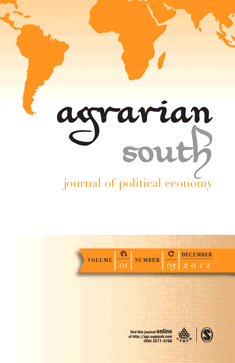
Agrarian South-Journal of Political Economy
Fostering Scholarly Dialogue on Sustainable Development in Developing RegionsAgrarian South-Journal of Political Economy is a prestigious academic journal published by SAGE Publications Inc, dedicated to advancing the understanding of the intricate relationships between agrarian structures and socio-economic dynamics in the Global South. With a keen focus on cultural studies, ecology, geography, and social sciences, this journal offers a rich platform for interdisciplinary research that enhances scholarly dialogue and drives critical insights. The journal has achieved remarkable recognition, having been ranked Q1 in Cultural Studies and Q2 in various social science disciplines as of 2023, reflecting its impact and relevance in academia. Despite not offering Open Access, it remains a vital resource for researchers and students seeking to explore the socio-political dimensions of agrarian issues. By bridging empirical research with theoretical frameworks, Agrarian South aims to illuminate the complexities of agronomy in developing regions, fostering a deeper understanding and contributing to sustainable development.

NARRATIVE
Exploring the Art of Storytelling and TheoryNARRATIVE is a distinguished academic journal published by Ohio State University Press, focusing on the intricate dimensions of literature and literary theory. Established in 2002, this journal has quickly risen to prominence, currently ranking first quartile (Q1) in its field according to 2023 metrics, and securing an impressive percentile of 94th among 1106 journals in Arts and Humanities. With its ISSN 1063-3685 and E-ISSN 1538-974X, NARRATIVE is committed to exploring the narrative structures and processes that shape our understanding of both literature and broader cultural phenomena. Although it does not offer open access, NARRATIVE proudly contributes to academic discourse by publishing articles that challenge, inform, and inspire scholars, professionals, and students worldwide. The journal continues to be an essential platform for innovative research and critical analysis, fostering dialogue at the intersection of storytelling, identity, and societal context.